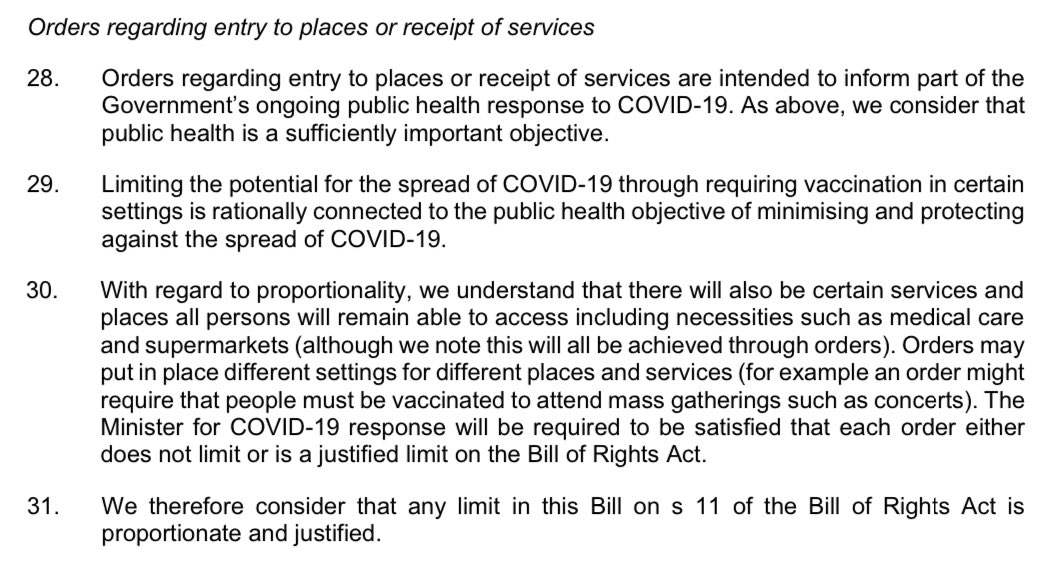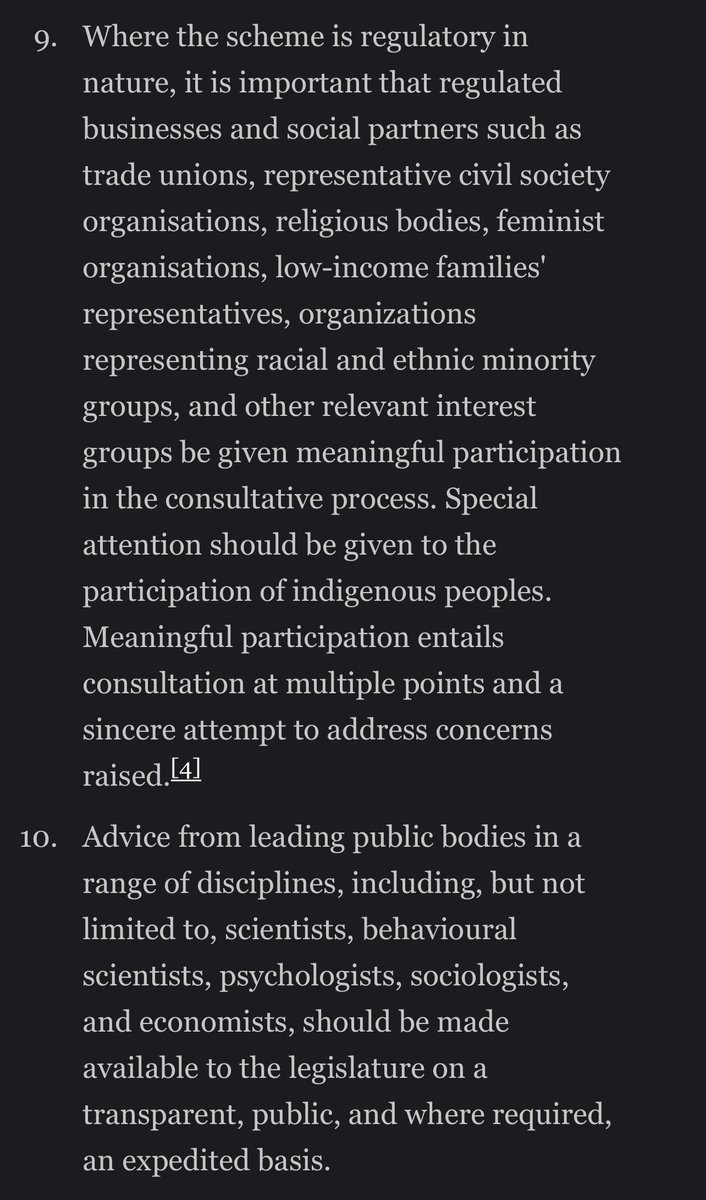
COVID-19 Response (Vaccinations) Legislation Bill now available.
legislation.govt.nz/bill/governmen…
legislation.govt.nz/bill/governmen…

To be clear, it is a constitutional disgrace that the legislation mandating this vaccination regime is being passed urgently this week, without provision for prior/adequate consultation on the legislative framework.
Whether you support the new Covid protection framework (which I do) or not, legislative change seriously implicating rights like this needs much more time to breathe, to be interrogated and for its legitimacy to be built through dialogue.
From a quick look, also concerning is the framework is empowering only, leaving much of the detail of the protection framework/vaccination mandates to be settled in Covid-19 orders made by the minister. Again, quite concerning - esp given the novelty of the measures.
Curious though -- and perhaps another instance of constitutional humility -- there doesn't seem to be any change to legal expectation that Covid-19 orders re vax mandates must be Bill of Rights consistent. That is, no amendments to s13(2) or direct protection in primary legn.
That perhaps a suite of further judicial review applications challenging vax mandates in the new year... Joy. 🙄
And a reminder that sound expression of international best/acceptable practice for implementing vax mandates etc is explained here, by the @lexatlasc19 consortium, of which I am a contributing member.
lexatlas-c19.org/vaccination-pr…
lexatlas-c19.org/vaccination-pr…
Also the -- somewhat sparse -- departmental disclosure statement also the demonstrates the lack of adequate appraisal and engagement in the development of the bill.
disclosure.legislation.govt.nz/assets/disclos…
disclosure.legislation.govt.nz/assets/disclos…
Ofc, we're in a pandemic and sometimes emergency settings means it's inevitable that some things are expedited in suboptimal ways.
But not this: the need for this framework was not unexpected, was signalled some time ago, and public participation could have been factored in.
But not this: the need for this framework was not unexpected, was signalled some time ago, and public participation could have been factored in.
How do we ameliorate this poor law-making process?
As a minimum, the enacted legislation needs to be immediately referred to a select committee for a (swift) post-enactment consultation and review.
But with important conditions:
As a minimum, the enacted legislation needs to be immediately referred to a select committee for a (swift) post-enactment consultation and review.
But with important conditions:
1. This review and report needs to be done swiftly, so that recommendations can be made in short order and are not lost when Parliament shuts down over summer, when we'll be living under the framework.
2. There needs to be some mechanism for the recommendations to come back to the House, where they can be *seriously* considered as proposed amendments (that was the failing of the previous post-enactment review of the C19 Public Health Response Act).
3. There should be a sunlight clause on legislative amendments passed this week - a mid-term milestone - that requires House to review and adjust framework as necessary. A further and considered sel comm process (in addition to swift post enactment review) should support that.
And, to anticipate some defensive explanation, consultation with a handful of business groups against a general sketch of traffic lights doesn’t cut the mustard. The legal framework and worked out detailed rules need sometime to breathe too - which is why consultation was needed.
And I would be interested to know the extent of consultation with Māori and iwi organisations about the design of this legislative framework - as expected under te Tiriti. We know the govt dropped the ball on that last time.
And here is the Min of Justice vet of the draft bill:
justice.govt.nz/assets/Documen…
justice.govt.nz/assets/Documen…
And, with due respect to my ministry friends, this does not qualify as a serious appraisal of rights-implications of vax mandate regime. That's not a quibble with their work but rather a point about how framework kicks details of regime – and rights-implications – down the road.
As the heavy lifting is done by ministerial orders, which must be Bill of Rights consistent to be legally valid, the vet presumes that will be so - and we don't get any deep analysis of proportionality and justifiability. See eg [28]-[31] re vax mandates for customers.
sunset *
We won’t get a chance to make submission on the bill it seems. If I had have, one of the key points I would have made is that the detail of the framework should have been spelt out in primary legislation, not ministerial orders.
Parliament needs to seize of the virtues of mandates and rights implications, and grapple with the balance — the importance of the framework demands the highest order of deliberation and social licence.
Vax mandates orders are different to alert level orders. The latter needed to be nimble and made swiftly. The former will no doubt be more stable and won’t need to be made urgently. There’s not the same need for the details of vax mandates to left to executive decree.
seize the debate about the *
A few more thoughts, on process and substance, about the COVID-19 Response (Vaccinations) Legislation Bill that Parliament is passing via urgency at the moment — all 3 readings in two days, ie one evening and probably one morning of debates.
The bill is perhaps the most important law passed by Parliament this year, because it unlocks the powers for delivering the Covid protection framework — ie, “traffic light system”— that will dominate life under this phase of the pandemic.
covid19.govt.nz/alert-levels-a…
covid19.govt.nz/alert-levels-a…
Vaccination — and vax mandates — lies at the core of that. Customers and workers will need to be vaxxed for the most part, although businesses will often get to choose whether to operate with vax mandates (but their ability to operate will be restricted if not)
There is no doubt that mandates will become standard and inevitably widespread (to be clear, something I wholeheartedly support).
The surprising thing about the Bill is that it doesn’t actually implement the Covid protection framework or vax mandates. All it does is tweak the C19 Public Health Response regime to allow that framework to be promulgated by ministerial orders in due course.
Employment-related provisions are also introduced — anticipating vax mandates and dealing with the employment consequences of vax mandates in the workplace, incl what happens to those unable to work as a result.
That design — empowering framework only with ministerial orders to follow — is the first serious concern and surprise. Best practice would suggest the framework should be largely spelt out in primary legislation, with the imprimatur of Parliament, not left to ministerial decree.
The govt seems to be taking the view that this legislation is “technical” only, because all it does is more solidly provide the authorisation and settings for vax mandates and traffic lights.
Perhaps, but that misses the point.
Traffic lights are a new style of regulation, without any tradition in application to the population as a whole. We would expect the policy-calculus and key design choices to be subjected to democratic debate in our Parliament.
Traffic lights are a new style of regulation, without any tradition in application to the population as a whole. We would expect the policy-calculus and key design choices to be subjected to democratic debate in our Parliament.
We might expect core provisions to be spelt out in bill. Eg, idea that there will be 3 types of qualifying businesses, as we understand:
- life preserving “essential” businesses, where vax mandates are prohibited
- high risk, where they will be mandated
- others, by choice.
- life preserving “essential” businesses, where vax mandates are prohibited
- high risk, where they will be mandated
- others, by choice.
Importantly, those life preserving businesses should be spelt out in primary legislation as a key liberty protection, even if there is provision for that list to be revised in the future if necessary.
So too the broad definition of the high risk category where they will be obligatory — at least in form of a typology or key criteria.
This is basic rule of law stuff.
The ministerial discretion to design the regime needs to be provided for and conditioned by law.
No one expects all the detail to be settled. But we should be able to see the shape and key choices sketched in primary legislation.
The ministerial discretion to design the regime needs to be provided for and conditioned by law.
No one expects all the detail to be settled. But we should be able to see the shape and key choices sketched in primary legislation.
That then allows the rights implications to be grappled with by our elected representatives — and for them to feel the “political heat” for the balancing and choices they make.
And that expectation — that primary legislation would do much of the heavy lifting — is partly why I said at the outset that this process, where the empowering legislation is passed in two days without consultation, is a constitutional disgrace.
Best practice concedes that expedition may be necessary in some pressing circumstances — but only as a temporary quick fix. 

And, as I said earlier, the need for this regime was known for some time, it will be enduring and it should have been developed and enacted through robust means.
Also note the expectation that, in the NZ context, Māori and iwi organisations would be involved in design of the regulatory scheme. 

The debates last night in the House also suggest that the bill may not deliver the clear and explicit foundation for vax mandates anyways, even on the empowering framework only basis.
In proper dialogical tradition, the minster signalled the intention is to spell out the authority for general vax mandates to address the uncertainty/opacity identified by the courts.
The provisions which seem to be intended to do this for population-wide customer mandates etc are these - we think new s11(1)(b)(ia): 

In other words, entry to “specified premises” may only be permitted in “specified circumstances” (or be subject to “specified measures”).
Neither specified circumstances or specified measures are defined (but sort of reflect the general words in the chapeau in the existing s11(1)).
Presumably, though, if you read between the lines, that is meant to mean by presenting a vax certificate or exemption.
Presumably, though, if you read between the lines, that is meant to mean by presenting a vax certificate or exemption.
Spell it out! At least there should be some mention in this crucial clause of the potential for vaccination as a condition of entry, even if only in brackets as an example.
Compare the way it *is* spelt out in the counterpart provision, ie new s11(1)(h), which authorises rules regulating where vaccination must NOT be required as a condition of entry.
I wonder if (hope?) we will see a govt SOP to mop this up this morning.
One more thought on the process and design of this.
Where is the @nzlawsociety and its important rule of law lens and contribution on legislative design?
They were oddly missing, I think, from the handful of organisations privileged by govt with pre-introduction engagement.
Where is the @nzlawsociety and its important rule of law lens and contribution on legislative design?
They were oddly missing, I think, from the handful of organisations privileged by govt with pre-introduction engagement.
The @NZHumanRights also missed out on engagement in design it seems, and has expressed concern about that and the process.
And I need some damn coffee now. ☕️
• • •
Missing some Tweet in this thread? You can try to
force a refresh





















